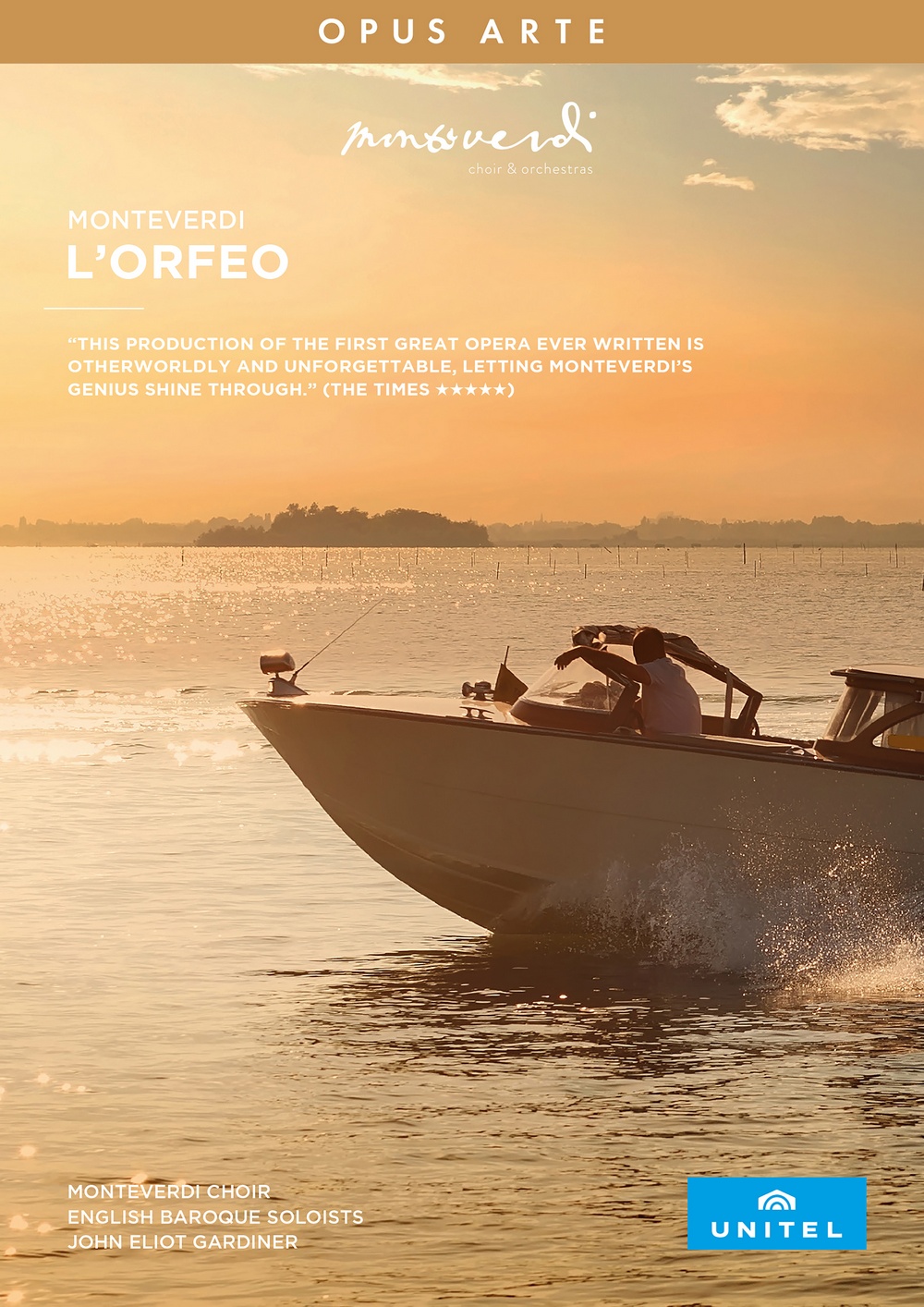Hana Blažíková (La Musica/Euridice); Krystian Adam (Orfeo); Anna Dennis (Ninfa); Kangmin Justin Kim (Speranza); Lucile Richardot (Messaggera); Francesca Boncompagni (Proserpina); Gareth Traseder (Pastore I); Gianluca Buratto (Caronte/Plutone); Furio Zanasi (Apollo); Michał Czerniawski (Pastore III)
Considered to be one of the first operas in history, Monteverdi’s L’Orfeo (1607) re-enacts the tragic Greek saga of Orpheus and Euridice. In an attempt to bring his dead bride, Euridice, back to life, Orpheus descends to the underworld. But he fails to fulfil one vital condition: Orpheus is not allowed to look back at Euridice when she follows him back to the living world. Since he cannot prevent himself from turning around, his bride is forced to return to the world of the dead. Orpheus loses himself in the violence of grief, suffering but also growing and finally coming to a new and deeper understanding of himself. Called ‘a fable in music’ by Monteverdi, L’Orfeo was one of the most frequently performed operas of its era and is a magical introduction to Monteverdi’s probing investigation of human nature, character and desire by means of music. Combining beautiful melodies and tremendous sense of structure, Monteverdi shows “how the story unfolds in the most persuasive, inexorable way”, enthuses Gardiner over the Italian composer: “It’s a wonderful tale and Monteverdi’s music is extraordinary in the way it scales the heights of emotion, it scales from the euphoria and the exaltation of the nuptial ceremony to the utter dejection of his loss of Euridice and it makes it one of the greatest operas of all time.”
DVD
BLU-RAY
John Eliot Gardiner
English Baroque Soloists; Monteverdi Choir
Hana Blažíková; Krystian Adam; Anna Dennis; Kangmin Justin Kim; Lucile Richardot; Francesca Boncompagni; Gareth Traseder; Gianluca Buratto; Furio Zanasi; Michał Czerniawski; English Baroque Soloists; Monteverdi Choir; John Eliot Gardiner
Those who have been fortunate enough to hear all of these performances will have seen how Gardiner’s hand-picked lineup of soloists has been knitted into a real company, with many of the singers taking roles in all three operas.
Binding it together was Gardiner, knowing exactly when to allow the drama to unfold naturally, when to give it an extra push and how to give the ceremonial moments, with cornetti and sackbuts to the fore, regal and magical power. Played straight through, without an interval, it was all magically coherent, every phrase totally memorable." (The Guardian ★★★★★)
"Gardiner has always spoken of how special Monteverdi is to him – he named his flagship choir after him, after all! – and for this anniversary year he has prepared a trilogy of the operas to celebrate the composer in a fresh, dynamic way. He writes in the programme note that he wants to “put the excitement, and perhaps also the trepidation, back into [Monteverdi’s] music.”
That was evident in every element of this tremendously involving performance. This was billed as a concert performance and, true, there was no proscenium and no painted flats. In every other sense, however, it was as compellingly theatrical a performance as I’ve seen, with costumes, lighting and a use of the Usher Hall space that turned it into a theatrical space as effective as any in Edinburgh.
The cast were all remarkably sensitive to the demands of the Renaissance style – where else will you hear such vocal trills? – and excelled in the way they brought the drama to life.
In this midst of it all, like some presiding spirit, stood Gardiner himself, bringing his lifetime of experience with Monteverdi to bear on a reading of authority but also great sympathy, and his musicians rose to the occasion with great alacrity.
n short, this was a treat. (Review of Edinburgh Festival Performance of this production)" (Seen and Heard International)
"This production of the first great opera ever written is otherworldly and unforgettable, letting Monteverdi’s genius shine through.
Played straight through, without an interval, it was all magically coherent, every phrase totally memorable.
Monteverdi’s genius shone through at every turn in this vibrant, heartfelt performance…
Every soloist caught the ear, particularly Lucile Richardot’s plangent La Messaggera and Gianluca Buratto’s sepulchral Caronte/Plutone." (The Times ★★★★★)
"A better presentation of this beautiful, serene masterpiece would be hard to imagine
The music’s madrigalian character means a lot of work for the chorus, and here the Monteverdi Choir were in their element, singing, dancing and acting with verve, precision but evident enjoyment.
Anna Dennis was excellent, for the third time of asking, as Speranza, the Hope that is abandoned entering Hades; Lucile Richardot handled superbly her long, slow entrance as the bearer of ill tidings. But in the end it was Adam and Buratto who mattered, the first great operatic confrontation; and Gardiner, the ultimate master of ceremonies." (The Arts Desk)
"There is no finer interpreter of Monteverdi than Gardiner, whose choir bears that composer's name. There is a characteristic concentration on the subtleties of dynamics in all the singing, and wonderful nuances in the orchestral playing." (British Theatre Guide)
"The orchestral playing and choral singing really are splendid...The whole work is performed a tone above written pitch which adds a certain brightness to the sound." (BBC Music Magazine ★★★★)
"John Eliot Gardiner's conducting is by turns measured and sprightly, and, as ever, he remains very attuned to his singers. And they are a fine bunch, particularly Krystian Adam's Orfeo, with a tenor not just pleasing in timbre and very technically adept, but also very dramatically alert." (Opera Now ★★★)
"Hana Blažíková sings La Musica’s prologue with deftly stylish eloquence… Krystian Adam is an ardent Orfeo and the underworld scene between Properpina and Plutone is sung touchingly by Francesca Boncompagni and Gianluca Burrato… The show is stolen by Lucile Richardot’s mesmerising Messenger" (Gramophone Awards 2022)
Hana Blažíková (La Musica/Euridice); Krystian Adam (Orfeo); Anna Dennis (Ninfa); Kangmin Justin Kim (Speranza); Lucile Richardot (Messaggera); Francesca Boncompagni (Proserpina); Gareth Traseder (Pastore I); Gianluca Buratto (Caronte/Plutone); Furio Zanasi (Apollo); Michał Czerniawski (Pastore III)
Considered to be one of the first operas in history, Monteverdi’s L’Orfeo (1607) re-enacts the tragic Greek saga of Orpheus and Euridice. In an attempt to bring his dead bride, Euridice, back to life, Orpheus descends to the underworld. But he fails to fulfil one vital condition: Orpheus is not allowed to look back at Euridice when she follows him back to the living world. Since he cannot prevent himself from turning around, his bride is forced to return to the world of the dead. Orpheus loses himself in the violence of grief, suffering but also growing and finally coming to a new and deeper understanding of himself. Called ‘a fable in music’ by Monteverdi, L’Orfeo was one of the most frequently performed operas of its era and is a magical introduction to Monteverdi’s probing investigation of human nature, character and desire by means of music. Combining beautiful melodies and tremendous sense of structure, Monteverdi shows “how the story unfolds in the most persuasive, inexorable way”, enthuses Gardiner over the Italian composer: “It’s a wonderful tale and Monteverdi’s music is extraordinary in the way it scales the heights of emotion, it scales from the euphoria and the exaltation of the nuptial ceremony to the utter dejection of his loss of Euridice and it makes it one of the greatest operas of all time.”
DVD
BLU-RAY
John Eliot Gardiner
English Baroque Soloists; Monteverdi Choir
Hana Blažíková; Krystian Adam; Anna Dennis; Kangmin Justin Kim; Lucile Richardot; Francesca Boncompagni; Gareth Traseder; Gianluca Buratto; Furio Zanasi; Michał Czerniawski; English Baroque Soloists; Monteverdi Choir; John Eliot Gardiner
Those who have been fortunate enough to hear all of these performances will have seen how Gardiner’s hand-picked lineup of soloists has been knitted into a real company, with many of the singers taking roles in all three operas.
Binding it together was Gardiner, knowing exactly when to allow the drama to unfold naturally, when to give it an extra push and how to give the ceremonial moments, with cornetti and sackbuts to the fore, regal and magical power. Played straight through, without an interval, it was all magically coherent, every phrase totally memorable." (The Guardian ★★★★★)
"Gardiner has always spoken of how special Monteverdi is to him – he named his flagship choir after him, after all! – and for this anniversary year he has prepared a trilogy of the operas to celebrate the composer in a fresh, dynamic way. He writes in the programme note that he wants to “put the excitement, and perhaps also the trepidation, back into [Monteverdi’s] music.”
That was evident in every element of this tremendously involving performance. This was billed as a concert performance and, true, there was no proscenium and no painted flats. In every other sense, however, it was as compellingly theatrical a performance as I’ve seen, with costumes, lighting and a use of the Usher Hall space that turned it into a theatrical space as effective as any in Edinburgh.
The cast were all remarkably sensitive to the demands of the Renaissance style – where else will you hear such vocal trills? – and excelled in the way they brought the drama to life.
In this midst of it all, like some presiding spirit, stood Gardiner himself, bringing his lifetime of experience with Monteverdi to bear on a reading of authority but also great sympathy, and his musicians rose to the occasion with great alacrity.
n short, this was a treat. (Review of Edinburgh Festival Performance of this production)" (Seen and Heard International)
"This production of the first great opera ever written is otherworldly and unforgettable, letting Monteverdi’s genius shine through.
Played straight through, without an interval, it was all magically coherent, every phrase totally memorable.
Monteverdi’s genius shone through at every turn in this vibrant, heartfelt performance…
Every soloist caught the ear, particularly Lucile Richardot’s plangent La Messaggera and Gianluca Buratto’s sepulchral Caronte/Plutone." (The Times ★★★★★)
"A better presentation of this beautiful, serene masterpiece would be hard to imagine
The music’s madrigalian character means a lot of work for the chorus, and here the Monteverdi Choir were in their element, singing, dancing and acting with verve, precision but evident enjoyment.
Anna Dennis was excellent, for the third time of asking, as Speranza, the Hope that is abandoned entering Hades; Lucile Richardot handled superbly her long, slow entrance as the bearer of ill tidings. But in the end it was Adam and Buratto who mattered, the first great operatic confrontation; and Gardiner, the ultimate master of ceremonies." (The Arts Desk)
"There is no finer interpreter of Monteverdi than Gardiner, whose choir bears that composer's name. There is a characteristic concentration on the subtleties of dynamics in all the singing, and wonderful nuances in the orchestral playing." (British Theatre Guide)
"The orchestral playing and choral singing really are splendid...The whole work is performed a tone above written pitch which adds a certain brightness to the sound." (BBC Music Magazine ★★★★)
"John Eliot Gardiner's conducting is by turns measured and sprightly, and, as ever, he remains very attuned to his singers. And they are a fine bunch, particularly Krystian Adam's Orfeo, with a tenor not just pleasing in timbre and very technically adept, but also very dramatically alert." (Opera Now ★★★)
"Hana Blažíková sings La Musica’s prologue with deftly stylish eloquence… Krystian Adam is an ardent Orfeo and the underworld scene between Properpina and Plutone is sung touchingly by Francesca Boncompagni and Gianluca Burrato… The show is stolen by Lucile Richardot’s mesmerising Messenger" (Gramophone Awards 2022)




























